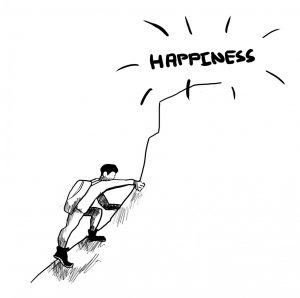Pursuing Happiness
May 3, 2019
“If you live in search of happiness, you’ll never get it. Happiness only exists as a byproduct of having a goal; it cannot successfully be a goal in itself.”
This is an idea that was floated and agreed upon in “The Debate of the Century,” where philosopher Slavoj Zizek and Professor Jordan Peterson debated happiness in capitalist and communist societies. Long story short, the debate was not that of the century; it was strangely non contentious, and the debaters ended up agreeing more than they disagreed.
This quote, though, stuck with me. Happiness cannot successfully be a goal in itself. It offers really important commentary on our practices today.
In one of the founding documents of the U.S., it was declared that the “unalienable rights” had by all humans were “life, liberty, and the pursuit of happiness.” John Lennon has a famous story about how he responded to a teacher asking him what he “wanted to be” when he grew up. Young Lennon said, “happy.” But both Zizek and Peterson would disagree, believing that this is the wrong approach.

It’s easy to see Lennon’s argument, and there is something beautiful in his statement. The point is to not be successful but to simply be doing what you love. Traditional success should not be the end-all be-all goal.
But the problem is that from Zizek’s philosophical and Peterson’s psychological perspective, if happiness is the goal, problems are likely to arise in the seeker’s life.
“What happens when you’re not happy?” asked Peterson. “Then you’re a failure.”
Zizek points out that passion is often characterized by the willingness to endure suffering. He claims that we do not want what we think we want. The meaningful pursuit of a goal, and possible progression towards it, is the ideal state for the well-being of the human. Zizek tells a story to prove the claim, “We want what we can’t have and don’t want what we can have.” This can be illustrated in the classic practice of “playing hard to get.” Desire is heightened by the difficulty of the project of obtainment.
What is ideal, then, is to keep an object of desire at some level of distance. According to Zizek, that is when we are most emotionally stimulated in a positive way.
So the conclusion to be drawn is that we should not ask ourselves what will make us happy if we obtain it, but what we care enough about to actively work toward toward, regardless of absolute completion.
“If only I had that new iPhone, then I would be happy.” This is the “pursuit of happiness” that our society operates within: consumerist hedonism. We seek pleasure through obtaining things. Things, though, are a consistently obtainable goal, and the pathway to the goal tends to be completely unrelated: labor. We attempt to obtain our goal through an unrelated process, and that is the problem.
So, Lennon was on to something, but still wasn’t quite right. In the end, we should live in search of a goal that we know we can at least make meaningful progress toward.





